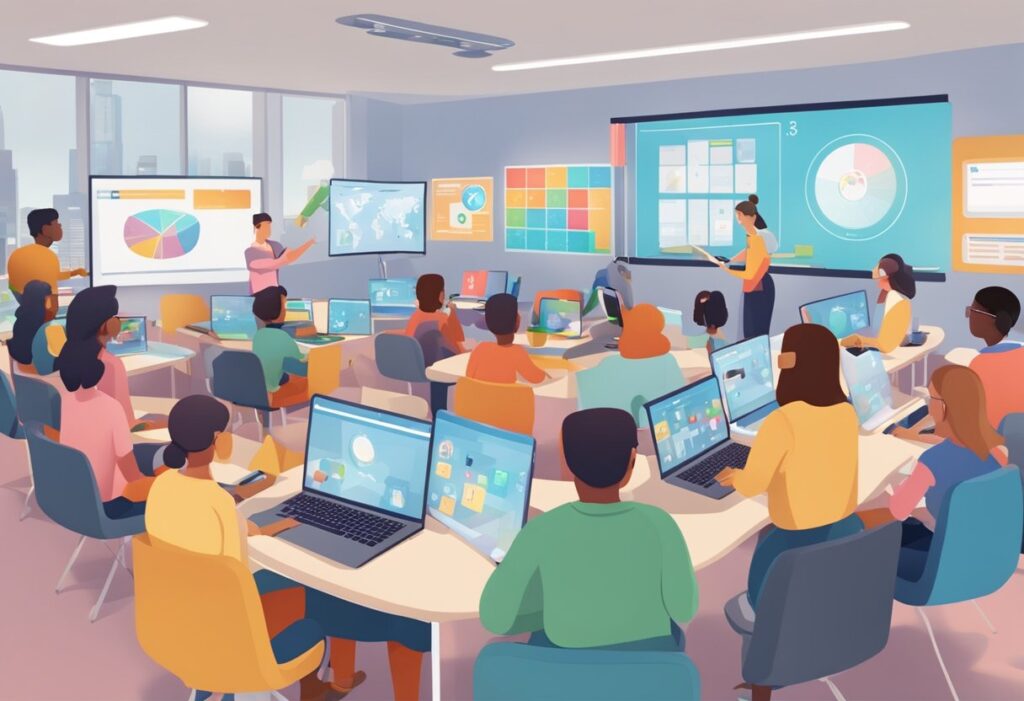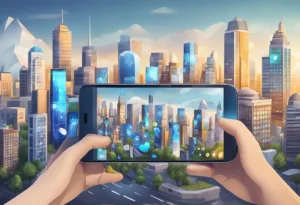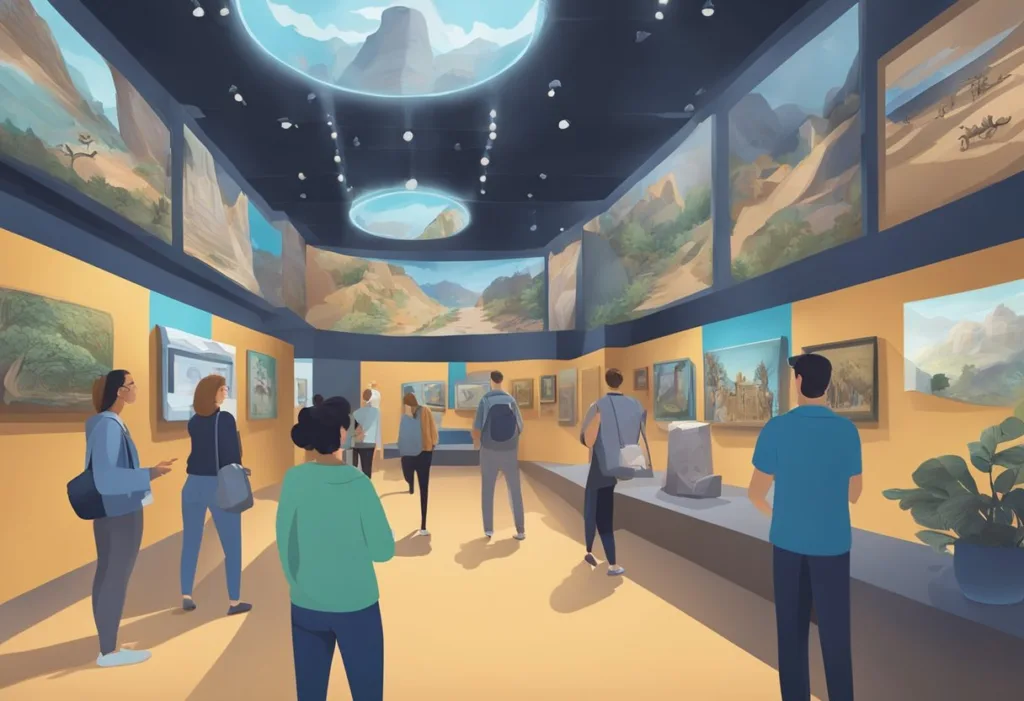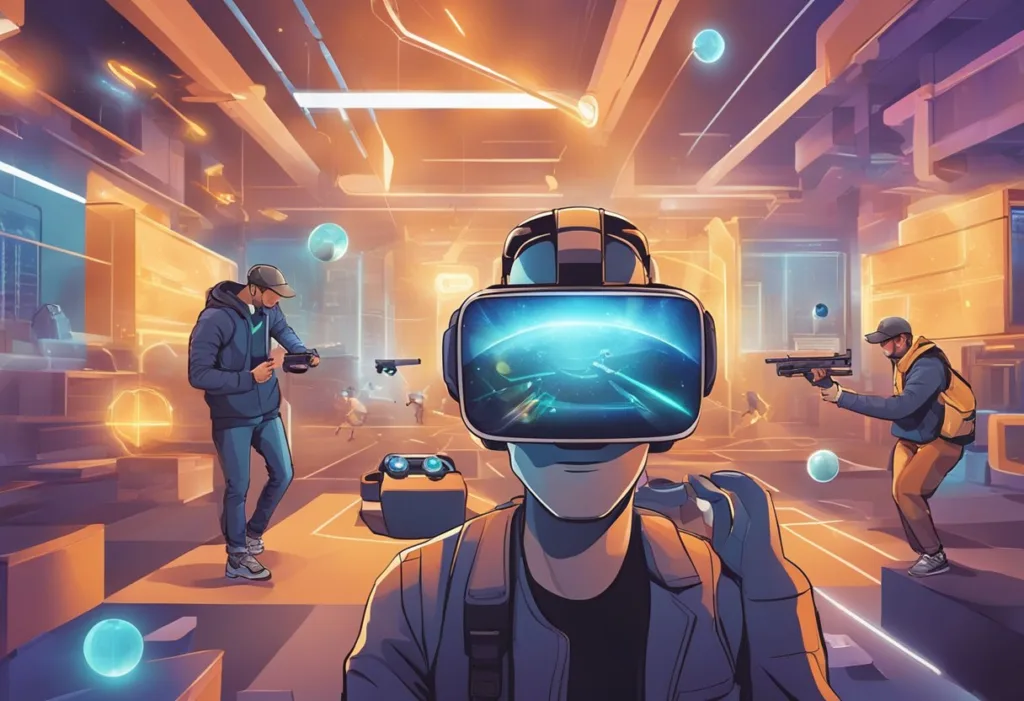Metaverse applications are becoming increasingly popular as technology advances and people seek new ways to interact with each other and the world around them.
The metaverse is a concept that refers to a shared virtual space where people can interact with each other and digital objects. It is a combination of virtual reality, augmented reality, and the internet, and it promises to revolutionize the way we live, work, and play.
One of the most exciting aspects of the metaverse is the potential for new platforms to emerge that enable people to create and explore new worlds. These platforms could be used for everything from gaming to education to socializing, and they could provide a level of immersion that is unparalleled in other forms of media.
As more people become interested in the metaverse, it is likely that we will see a proliferation of new applications and use cases emerge, as people explore the possibilities of this new technology.
The Top 11 Metaverse Applications
The metaverse is a virtual space where people can interact with each other in a digital world. It has become a popular concept in recent years, and there are now many applications that allow people to explore and interact with this new space. Here are the top 11 metaverse applications:
The Sandbox
The Sandbox is a virtual world where players can create and share their own games and experiences. It is built on blockchain technology, which allows for secure transactions and ownership of virtual assets. The Sandbox has a user-friendly interface that makes it easy for anyone to create their own virtual world.
Axie Infinity
Axie Infinity is a blockchain-based game where players can collect and breed digital creatures called Axies. These creatures can be used in battles against other players, and they can also be traded on a marketplace. Axie Infinity has gained a lot of popularity in recent months, and it has become one of the most valuable blockchain-based games.
MOBOX
MOBOX is a metaverse platform that allows users to create and trade their own virtual assets. It is built on the Binance Smart Chain, which allows for fast and cheap transactions. MOBOX has a user-friendly interface that makes it easy for anyone to create and trade their own virtual assets.
ZEPETO
ZEPETO is a social media app that allows users to create their own 3D avatars and interact with other users in a virtual world. It has become popular among younger users, and it has been used by celebrities and influencers to promote their brand.
Roblox
Roblox is a popular gaming platform where users can create and play their own games. It has a user-friendly interface that makes it easy for anyone to create their own game. Roblox has become popular among younger users, and it has been used by educators to teach coding and game development.
MojiPop
MojiPop is a social media app that allows users to create their own 3D avatars and share them with other users. It has become popular among younger users, and it has been used by brands to promote their products.
Enjin
Enjin is a blockchain-based platform that allows users to create and trade their own virtual assets. It is built on the Ethereum blockchain, which allows for secure transactions and ownership of virtual assets. Enjin has been used by game developers to create in-game items that can be traded on a marketplace.
metaNav
metaNav is a metaverse platform that allows users to explore and interact with virtual worlds. It has a user-friendly interface that makes it easy for anyone to explore and interact with virtual worlds.
Uhive
Uhive is a social media app that allows users to create their own virtual spaces and interact with other users in a virtual world. It has a user-friendly interface that makes it easy for anyone to create their own virtual space.
Stageverse
Stageverse is a virtual world where users can create and attend virtual events. It has a user-friendly interface that makes it easy for anyone to create and attend virtual events.
Ethereum
Ethereum is a blockchain-based platform that allows users to create and trade their own virtual assets. It is one of the most popular blockchain platforms, and it has been used by game developers to create in-game items that can be traded on a marketplace.
Real Use of Metaverse in the Real World
The metaverse is slowly becoming a reality and has made its way into different aspects of our daily lives. Here are the top 7 use cases of the metaverse in the real world.
1. Immersive Entertainment
Entertainment is one of the most popular use cases of the metaverse. The metaverse provides an immersive experience that can be used to create new types of games, movies, and other forms of entertainment.
2. Virtual Education
The metaverse can be used to create virtual classrooms, where students can interact with each other and their teachers. This approach can provide a more engaging and interactive learning experience.
3. Virtual Real Estate
The metaverse can be used to create virtual real estate, where people can buy and sell virtual land. This approach can provide a new way to invest in real estate and create new business opportunities.
4. Virtual Conferences
The metaverse can be used to create virtual conferences, where people can attend and participate in conferences from anywhere in the world. This approach can provide a more cost-effective and convenient way to attend conferences.
5. Virtual Healthcare
The metaverse can be used to create virtual healthcare, where doctors can interact with patients in a virtual environment. This approach can provide a more convenient and accessible way to receive healthcare.
6. Virtual Travel
The metaverse can be used to create virtual travel, where people can explore new places and cultures from anywhere in the world. This approach can provide a more immersive and cost-effective way to travel.
7. Virtual Commerce
The metaverse can be used to create virtual commerce, where people can buy and sell virtual goods and services. This approach can provide a new way to create business opportunities and generate revenue.
Metaverse Experiences
The metaverse offers a variety of experiences that range from gaming and entertainment to social media, virtual communities, education, and training.
Gaming and Entertainment
Games like Fortnite, Roblox, and Minecraft are some of the most popular metaverse applications that offer immersive gaming experiences.
Players can interact with each other, explore virtual worlds, and participate in various activities that are not possible in the real world. The metaverse allows game developers to create complex and interactive environments that are not limited by the physical world’s constraints.
Social Media and Virtual Communities
The metaverse allows people to create and join virtual communities where they can interact with others who share similar interests.
Social media platforms like Facebook and Twitter are already experimenting with metaverse applications that allow users to interact with each other in virtual environments. The metaverse also offers the potential for new social media platforms that are entirely based on virtual interactions.
Education and Training
The metaverse offers the potential for immersive educational experiences that can enhance student engagement with various subjects. It allows for massive shifts in training, education, and work.
The metaverse offers the potential to guide even the most complex field and service work, as well as being able to coordinate more fully with others. The metaverse technology is already being implemented in various industries, including healthcare, manufacturing, and education.
The metaverse offers a range of experiences that are not possible in the physical world. From gaming and entertainment to social media and education, the metaverse has the potential to revolutionize how people interact with each other and the world around them.
Economic and Business Opportunities
Virtual Real Estate and Digital Assets
The Metaverse presents new economic opportunities in virtual real estate and digital assets. Virtual real estate is a growing market, with companies like Decentraland offering virtual plots of land that can be developed and monetized.
The market for digital assets, including non-fungible tokens (NFTs), is also expanding rapidly. Gucci, for example, has recently entered the metaverse by launching its own NFTs. In addition to providing revenue streams for companies, virtual real estate and digital assets can also serve as a means of investment for individuals.
Marketing and Retail in the Metaverse
Marketing and retail in the Metaverse offer new avenues for companies to engage with consumers. The Metaverse is a fully functioning virtual economy that is often built on cryptocurrency and digital goods and assets.
Companies can leverage this to create new marketing strategies and retail experiences that are unique to the Metaverse. For example, companies can create virtual storefronts where consumers can browse and purchase products. The Metaverse also offers new opportunities for immersive marketing experiences that can engage consumers in new and exciting ways.
The Creator Economy and Employment
The Metaverse also presents new opportunities for the creator economy and employment. The Metaverse is populated by creators who develop and sell virtual goods and services. These creators can earn a living through the sale of their creations in the Metaverse.
In addition to this, the Metaverse also presents new opportunities for employment. Companies can hire individuals to create virtual experiences, develop virtual real estate, and manage virtual storefronts. As the Metaverse continues to grow, the creator economy and employment opportunities will continue to expand.
Metaverse Infrastructure
The metaverse is a complex system that requires robust infrastructure to operate efficiently. This section highlights the key infrastructure elements that are essential for the metaverse to function effectively.
Interoperability and Standards
Interoperability and standards are critical components of the metaverse infrastructure. The metaverse relies on a wide range of technologies, from virtual reality and augmented reality to blockchain and artificial intelligence. These technologies must be interoperable to ensure that users can move seamlessly between different metaverse environments.
To achieve interoperability, the metaverse needs to establish common standards for data exchange, identity management, and other key functions. This will enable users to move their assets and identities between different metaverse environments and ensure that they can interact with each other regardless of the platform they are using.
Security, Privacy, and Governance
Security, privacy, and governance are also essential components of the metaverse infrastructure. The metaverse is a decentralized system that operates on public blockchains, which means that security and privacy are critical to prevent malicious actors from exploiting vulnerabilities in the system.
Governance is also important to ensure that the metaverse operates fairly and transparently. The metaverse needs to establish clear rules and regulations to govern how it operates, including how data is collected, stored, and used.
To ensure the security, privacy, and governance of the metaverse, it is essential to establish robust data protection mechanisms, such as encryption and secure identity management systems. Tthe metaverse needs to establish clear rules and regulations to govern how it operates, including how data is collected, stored, and used.
The metaverse infrastructure needs to be designed to ensure that it can handle the massive amounts of data and traffic that will flow through it. This will require a combination of cutting-edge technologies, robust standards, and effective governance mechanisms.
Frequently Asked Questions
What are the key benefits of integrating the metaverse in educational settings?
The metaverse offers a unique and interactive learning experience that can enhance traditional teaching methods and provide students with a more engaging and immersive environment.
By using the metaverse, educators can create virtual classrooms and simulations, which can help students better understand complex concepts and theories. The metaverse can provide students with the opportunity to collaborate with peers from around the world, improving their communication skills and cultural awareness.
How are companies leveraging the metaverse for business growth and customer engagement?
Companies are using the metaverse to create immersive brand experiences that can engage customers in new and exciting ways.
For example, fashion companies are creating virtual stores where customers can try on clothes and accessories, while car manufacturers are using the metaverse to showcase their latest models. The metaverse can provide companies with valuable data on customer behavior and preferences, which can be used to improve products and services.
What potential does the metaverse hold for the future of healthcare services?
The metaverse has the potential to revolutionize healthcare by providing patients with access to remote consultations and virtual treatments. For example, doctors can use the metaverse to diagnose and treat patients in real-time, regardless of their location.
The metaverse can provide patients with a more engaging and interactive experience, which can improve their overall well-being and mental health.
Can you outline the primary advantages and disadvantages associated with the metaverse?
The primary advantage of the metaverse is its ability to provide users with an immersive and interactive experience that can enhance various aspects of their lives.
However, the metaverse also has some disadvantages, such as the potential for addiction and the risk of cyberbullying and other forms of online harassment. The metaverse can be expensive to develop and maintain, which can limit its accessibility to certain users.
In what ways can the metaverse impact and enhance real-world applications?
The metaverse can impact and enhance real-world applications by providing users with a more immersive and interactive experience.
For example, architects can use the metaverse to create virtual models of buildings, allowing clients to explore and interact with the design before construction begins. The metaverse can be used to train employees in various industries, such as healthcare and manufacturing, providing them with a safe and controlled environment to practice their skills.
What are some notable use cases that demonstrate the metaverse’s versatility across different industries?
The metaverse has been used in various industries, including gaming, entertainment, education, and healthcare. For example, the popular game “Second Life” has been used to simulate real-world scenarios and provide users with a virtual platform for socializing and networking.
The metaverse has been used by educators to create virtual classrooms and simulations, while healthcare providers have used the metaverse to diagnose and treat patients remotely.
What are the applications of a metaverse?
The applications of a metaverse are numerous and varied, ranging from gaming and entertainment to education, healthcare, and business. The metaverse can be used to create virtual environments and simulations, provide remote consultations and treatments, and enhance customer engagement and brand experiences.
What apps can be used in the metaverse?
There are various apps that can be used in the metaverse, including social networking apps, gaming apps, and productivity apps. Some popular metaverse apps include “Second Life,” “Decentraland,” and “Sansar.”
What can metaverse be used for?
The metaverse can be used for a wide range of purposes, including entertainment, gaming, education, healthcare, and business. The metaverse can provide users with an immersive and interactive experience that can enhance various aspects of their lives, from learning and socializing to shopping and working.
What is the application of metaverse in real life?
The application of the metaverse in real life is vast and varied, ranging from remote consultations and virtual treatments in healthcare to virtual classrooms and simulations in education. The metaverse can be used to enhance customer engagement and brand experiences in business, as well as provide users with a more immersive and interactive entertainment experience.














